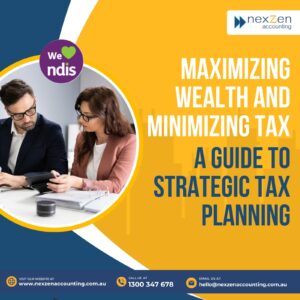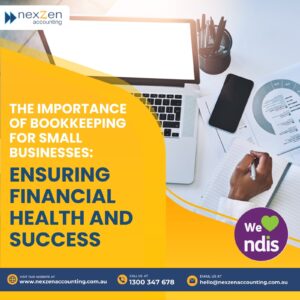You’re a small business owner with a lot on your plate.
You’ve just created your business, and your sales are hard to predict. You know you’re nowhere near the $75,000 GST (Goods and Services Tax) limit, though.
Should you even bother registering for GST?
If you do register, what are the benefits?
Will it be expensive? Will it help you save money?
Do customers prefer GST—or not?
What are the reporting requirements?
You’re busy, so we’ll be quick: It may be a good idea for NDIS service providers to register for GST. Yes, even small ones who don’t meet the requirements.
You can register voluntarily, and there are several good reasons why you should.
In this guide, we’ll cover them all.
GST Registration Requirements
First, let’s look at the registration requirements for GST. These are straight from the Australian Taxation Office. If you meet these requirements, you don’t have a choice—you must register for GST. If not, you may voluntarily register for GST anyway. We’ll discuss that later.
According to the ATO, you must register for GST if
- Your turnover is $75,000 or more. You can calculate your GST turnover by multiplying the current month’s sales by 12. If the number is $75,000 or more, you must register for GST within 21 days. (If you’re running a non-profit organisation, your GST turnover threshold is $150,000 or more.)
- You provide taxi or limousine service. Your GST turnover doesn’t matter.
- You want to claim fuel tax credits. Your GST turnover doesn’t matter in this case, either.
There are special rules for non-residents. You should check your sales each month to determine whether you’re over the threshold and need to register.
GST Requirements
If you register for GST, you’re required to
- Include GST in your sales price for most goods and services. GST is 10%.
- Claim GST credits for your qualified business purchases. (More info about this later.)
- Provide statements on sales activity to report total sales, GST, and GST credits.
That’s a lot of extra paperwork, right? Why would anyone register for GST if they aren’t legally obligated? We’re glad you asked…
Should You Be Registered for GST if You’re Not Required by Law?
Believe it or not, even with the extra paperwork and expense, it’s usually best to register for GST—yes, even if you’re not required to do so. GST is often beneficial for NDIS support providers.
Here’s how:
While most products and services require you to collect GST, as an NDIS support provider, your services are probably GST free. There are a few rules to follow, but most of your services should qualify for GST free status.
Expenses Qualify for Credits
If you’re registered for GST, you can get credits for the GST you pay on all your expenses. If you’re not registered for GST, you can’t claim these credits, and they add up quickly.
GST Affects Your Public Image
There’s one thing customers will automatically know about your business if you don’t charge GST: you don’t earn $75,000 in sales each year. Right or wrong, some customers may judge you based on this fact. Many small business owners register for GST to help protect their public image. It’s a bit of a marketing strategy. If you’re registered for GST, then people will automatically assume you meet the $75,000 threshold, which proves you’re a viable business.
Refund From ATO
You can get credits for any GST you pay for qualified expenses. If your total GST credits exceed the GST you owe on sales, you may get a refund from the ATO.
While most businesses won’t ever see a refund, most of your services should be GST free. When you file your quarterly report, you may qualify for a refund and actually save money by registering for GST.
Cost-Benefit Analysis of Volunteer GST Registration
Before you register for GST, though, let’s do a little cost-benefit analysis.
First, are most of your sales and services likely to qualify for GST exemption?
Will your expenses qualify for GST credits? (The answer is usually “yes.”)
Finally, is the additional paperwork and administrative load worth it to your business? You only need to file GST reports quarterly, but you’ll need to stay on top of your finances to ensure accurate reporting. (Hint: You should keep up with your bookkeeping whether or not you file for GST.)
After a cost-benefit analysis, most NDIS service providers find that registering for GST actually saves them money over time.
Please note that this is a general guide for NDIS service providers in Australia. Each organisation has its own individual characteristics, and we can’t accurately say whether you should register for GST without reviewing your finances. If you need assistance, nexZen tax experts can provide more personalized advice during a consultation. Connect to book a discovery call now.










